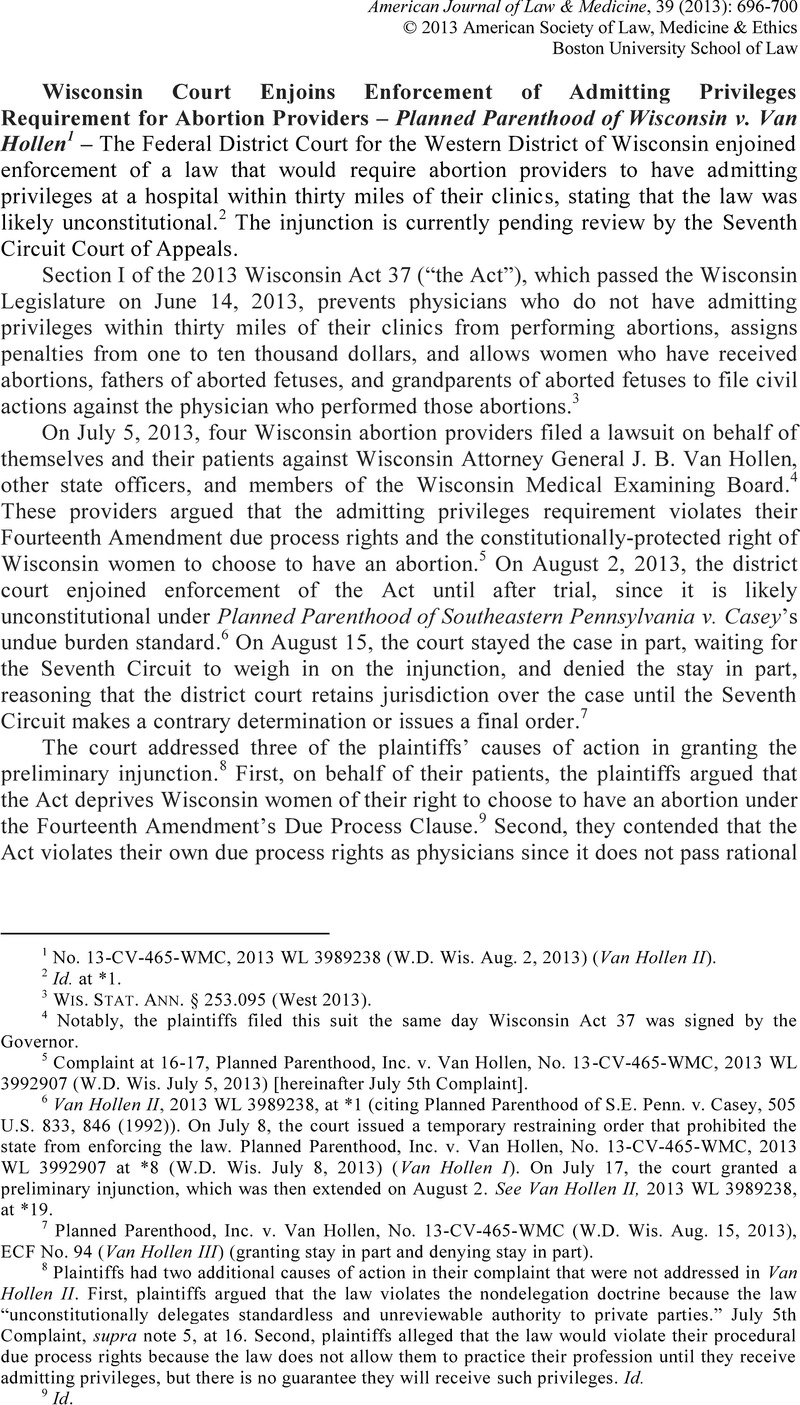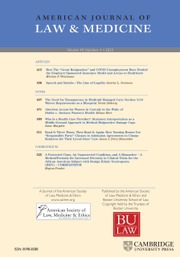No CrossRef data available.
Article contents
Wisconsin Court Enjoins Enforcement of Admitting Privileges Requirement for Abortion Providers – Planned Parenthood of Wisconsin v. Van Hollen
Published online by Cambridge University Press: 06 January 2021
Abstract

- Type
- Recent Case Developments
- Information
- Copyright
- Copyright © American Society of Law, Medicine and Ethics and Boston University 2013
References
1 No. 13-CV-465-WMC, 2013 WL 3989238 (W.D. Wis. Aug. 2, 2013) (Van Hollen II).
2 Id. at *1.
3 WIS. STAT. ANN. § 253.095 (West 2013).
4 Notably, the plaintiffs filed this suit the same day Wisconsin Act 37 was signed by the Governor.
5 Complaint at 16-17, Planned Parenthood, Inc. v. Van Hollen, No. 13-CV-465-WMC, 2013 WL 3992907 (W.D. Wis. July 5, 2013) [hereinafter July 5th Complaint].
6 Van Hollen II, 2013 WL 3989238, at *1 (citing Planned Parenthood of S.E. Penn. v. Casey, 505 U.S. 833, 846 (1992)). On July 8, the court issued a temporary restraining order that prohibited the state from enforcing the law. Planned Parenthood, Inc. v. Van Hollen, No. 13-CV-465-WMC, 2013 WL 3992907 at *8 (W.D. Wis. July 8, 2013) (Van Hollen I). On July 17, the court granted a preliminary injunction, which was then extended on August 2. See Van Hollen II, 2013 WL 3989238, at *19.
7 Planned Parenthood, Inc. v. Van Hollen, No. 13-CV-465-WMC (W.D. Wis. Aug. 15, 2013), ECF No. 94 (Van Hollen III) (granting stay in part and denying stay in part).
8 Plaintiffs had two additional causes of action in their complaint that were not addressed in Van Hollen II. First, plaintiffs argued that the law violates the nondelegation doctrine because the law “unconstitutionally delegates standardless and unreviewable authority to private parties.” July 5th Complaint, supra note 5, at 16. Second, plaintiffs alleged that the law would violate their procedural due process rights because the law does not allow them to practice their profession until they receive admitting privileges, but there is no guarantee they will receive such privileges. Id.
9 Id..
10 Id. at 17.
11 Id.
12 Van Hollen II, 2013 WL 3989238, at *12.
13 Id. at *8.
14 Id. at *7.
15 Id. at *6. The defendants recognized that the law would add additional obstacles for women seeking abortions. Id.However, the only obstacle the defendants explicitly mentioned was the additional 56 gas money women might spend to travel to a clinic. Id. The defendants dismissed this obstacle because they said that a non-profit organization would likely supply the funds. Id.
16 See id. at *12. The plaintiffs advocated for a heightened standard of review, but the court found “no basis” for heightened scrutiny, although it said that the state held the burden of proving a reasonable relationship between the law and its purpose. Id.
17 Id. at *14-15.
18 Id. at *8.
19 Id.
20 Id. at *9-10.
21 Id. at *10.
22 550 U.S. 124, 166 (2007).
23 Van Hollen II, 2013 WL 3989238, at *14 (citing Gonzales, 550 U.S. at 165-66).
24 Van Hollen II, 2013 WL 3989238, at *14.
25 Id.
26 Id. at *15.
27 See Roe v. Wade, 410 U.S. 113, 154 (1973); Planned Parenthood of S.E. Penn. v. Casey, 505 U.S. 833 (1992). But see Harris v. McRae, 448 U.S. 297, 317 (1980) (finding that a federal statute eliminating federal funding for abortion did not impinge on a woman's right to access an abortion); Brennan, Annemarie, Is All Privacy Created Equal?, 20 Vt. L. Rev. 815, 822 (1996)Google Scholar (commenting that “protection of decisional privacy in the abortion context is now considered ‘Roe's essential holding’”).
28 See Casey, 505 U.S. at 877-78.
29 Van Hollen II, 2013 WL 3989238, at *17. Similarly, an Arizona case challenging regulations on Arizona abortion providers (including an admitting privileges requirement) found that “[a] significant increase in the cost of abortion or the supply of abortion providers and clinics can, at some point, constitute a substantial obstacle to a significant number of women choosing an abortion.” Tucson Woman's Clinic v. Eden, 379 F.3d 531, 541 (9th Cir. 2004).
30 Van Hollen II, 2013 WL 3989238, at *18.
31 Id.
32 See id. at *17 (citing Okpalobi v. Foster, 190 F.3d 337, 357 (5th Cir. 1999) (finding an undue burden in a case where a regulation would have shut down clinics providing 80% of abortion services in Louisiana)); Planned Parenthood Se., Inc. v. Bentley, No. 2:13CV405-MHT, 2013 WL 3287109, at *6 (M.D. Ala. June 28, 2013) (holding that the plaintiffs were likely to show an undue burden in a case where legislation requiring admitting privileges would create a “drastic limitation in the availability of providers”); Jackson Women's Health Org. v. Currier, No. 3:12CV436-DPJ-FKB, 2013 WL 1624365, at *6 (S.D. Miss. Apr. 15, 2013) (enjoining a law requiring admitting privileges for abortion providers because it would lead to clinic closures); Tuscon, 379 F.3d at 541 (stating that an undue burden could exist when the supply of abortion providers and clinics decreases).
33 See Van Hollen II,2013 WL 3989238, at *2.
34 July 5th Complaint, supra note 5, at 4. The court noted that nineteen weeks was pre-viability. Van Hollen II, 2013 WL 3989238, at *16.
35 Van Hollen II,2013 WL 3989238, at *16-17.
36 Id.
37 Id.
38 See id. at *3.
39 See State Policies in Brief: Targeted Regulation of Abortion Providers, GUTTMACHER INST. 2 (Nov. 1, 2013), available at http://www.guttmacher.org/statecenter/spibs/spib_TRAP.pdf. Abortion providers are required to have admitting privileges in Kansas, Tennessee, Texas, and Utah. Arizona is in the process of developing similar laws. Id. Wisconsin, Alabama, Mississippi, and North Dakota have laws on the books that are currently subject to injunctions. Id. A Texas district court recently permanently enjoined an admitting privileges requirement. See Planned Parenthood of Greater Tex. Surgical Health Servs. v. Abbott, No. 1:13-CV-862-LY, 2013 BL 297515 (W.D. Tex. Oct. 28, 2013). However, the Fifth Circuit recently overturned that ruling, finding that the admitting privileges requirement was likely constitutional. This now means that the privileges requirement will be in effect until the case is decided. Planned Parenthood of Greater Tex. Surgical Health Servs. v. Abbott, No. 13-51008, 2013 WL 5857853 (5th Cir. Oct. 31, 2013); see also Eckholm, Erik, In Reversal, Court Allows Texas Law on Abortion, N.Y. TIMES, Oct. 31, 2013Google Scholar, http://www.nytimes.com/2013/11/01/us/most-of-law-on-abortion-is-reinstated-in-texas.html?_r=0.
40 See Benson Gold, Rachel & Nash, Elizabeth, TRAP Laws Gain Political Traction While Abortion ClinicsAnd the Women They ServePay the Price, 16 Guttmacher Pol’Y Rev. 7, 12 (2013)Google Scholar (arguing that the real purpose of TRAP laws are to limit access to abortion); Targeted Regulation of Abortion Providers (TRAP): Burdensome and Unnecessary Requirements Limit Access to Services, CTR. FOR REPRODUCTIVE RIGHTS (Mar. 5, 2009), http://reproductiverights.org/en/project/targeted-regulation-of-abortion-providers-trap (defining TRAP laws as those that “single out the medical practices of doctors who provide abortions … and impose on them requirements that are different and more burdensome than those imposed on other medical practices”). See generally Megan Cahill, Courtney, Abortion and Disgust, 48 Harv. C.R.-C.L. L. Rev. 409 (2013)Google Scholar (analyzing the motivations behind laws restricting access to abortion).
41 Editorial Board, Virginia's Assault on Abortion Claims a Victim, WASH. POST., Apr. 26, 2013, http://articles.washingtonpost.com/2013-04-26/opinions/38843097_1_walk-in-clinics-planned-parenthood-health-department.
42 J. Pepper Bryars, Of Course We Want to Close All Abortion Clinics (Opinion from J. Pepper Bryars), AL.COM (Aug. 07, 2013), http://www.al.com/opinion/index.ssf/2013/08/of_course_we_want_to_close_all.html.
43 Cahill also argues that abortion disgust should affect the level of scrutiny afforded by courts. Cahill, supra note 40, at 454.
44 Id.
45 Id.




